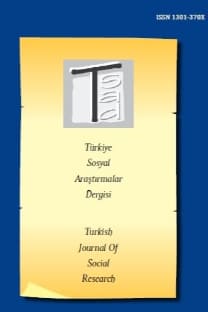ÜNİVERSİTE ÖĞRENCİLERİNİN İDEALLERİNDEKİ İŞE YÖNELMELERİNE ENGEL OLDUĞUNU DÜŞÜNDÜKLERİ İŞLEVSEL OLMAYAN KARİYER İNANÇLARI
Üniversite öğrencileri, ideal iş, işlevsel olmayan kariyer inancı
DYSFUNCTIONAL CAREER BELIEFS OF UNIVERSITY STUDENTS THAT THEY THINK WILL PREVENT THEM FROM DOING THEIR IDEAL JOB
University students, ideal job, dysfunctional career beliefs,
___
- Akkoç, F. F. (2012a). Lise öğrencilerinin mesleki kararsızlıkları ile kariyer inançları arasındaki ilişki. Buca Eğitim Fakültesi Dergisi, 32, 49-60.
- Akkoç, F. F. (2012b). Lise öğrencilerinin mesleki kararsızlıklarının sosyo-demografik faktörlere göre incelenmesi. Mehmet Akif Ersoy Üniversitesi Eğitim Fakültesi Dergisi, 23, 215-233.
- Austin, K. ve Cilliers, F. (2011). The psychometric relationship between career thinking and salutogenic functioning amongst unemployed adults. SA Journal of Industrial Psychology, 37, 1-11.
- Bertoch, S. C., Lenz, J. G., Reardon, R. C. ve Peterson, G. W. (2013). Goal instability in relation to career thoughts, decision state, and performance in a career course. Journal of Career Assessment, doi: 10.1177/0894845313482521.
- Bullock-Yowell, E., Katz, S. P., Reardon, R. C. ve Peterson, G. W. (2012). The roles of negative career thinking and career problem-solving self-efficacy in career exploratory behavior. The Professional Counselor: Research and Practice, 2, 102-114.
- Bullock-Yowell, E., Peterson, G. W., Reardon, R. C., Leierer, S. J. ve Reed, C. A. (2011). Relationships among career and life stress, negative career thoughts, and career decision state: A cognitive information processing perspective. Career Development Quarterly, 59, 302-314.
- Chason, A. K., Bullock-Yowell, E., Sampson, J. P., Lenz, J. G. ve Reardon, R. C. (2013). Relationships among career thoughts, career interests, and career decision state. The Canadian Journal of Career Development, 12, 39-48.
- Corbishley, M. A. ve Yost, E. B. (1989). Assessment and treatment of dysfunctional cognitions in career counseling. Career Planning and Adult Development Journal, 5(3), 20-26.
- Dimakakou, D. S., Mylonas, K., Argyropoulou, K. ve Tampouri, S. (2012). Career decision-making difficulties, dysfunctional thinking and general self-efficacy of university students in Greece. World Journal of Education, 2, 117-130.
- Dipeolua, A., Sniateckib, J. L., Storliec, C. A. ve Hargrave, S. (2013). Dysfunctional career thoughts and attitudes as predictors of vocational identity among young adults with attention deficit hyperactivity disorder. Journal of Vocational Behavior, 82, 79-84.
- Elliot, K. J. (1995). Anthetic dialogue: A new method for working with dysfunctional beliefs in career counseling. Journal of Career Development, 22, 141-148.
- Hamamcı, Z. ve Esen Çoban, A. (2007). Mesleki olgunluk ve mesleki kararsızlığın akılcı olmayan inançlarla ilişkisi. Türk Psikolojik Danışma ve Rehberlik Dergisi, 27, 31-42.
- Kleiman, T., Gati, I., Peterson, G., Sampson, J., Reardon, R. ve Lenz, J. (2004). Dysfunctional thinking and difficulties in career decision making. Journal of Career Assessment, 12, 312-331.
- Krumboltz, J. D. (1994). The Career Beliefs Inventory. Journal of Counseling and Development, 72, 424-428.
- Lee, J. C. ve Choi, I. H. (2006). The relationship among perfectionism, dysfunctional career thoughts, and career indecision. The Korean Journal of Counseling and Psychotherapy, 18, 853-872.
- Lustig, D. ve Strauser, D. (2008). The impact of sense of coherence on career thoughts for individuals with disabilities. Rehabilitation Counseling Bulletin, 51(3), 139- 147.
- Miles, M. B. ve Huberman A. M. (1994). An expanded sourcebook- Qualitative Data Analysis. London & New Delhi: Sage Publications.
- Peterson, G. W., Sampson, J. P., Jr. ve Reardon, R. C. (1991). Career development and services: A cognitive approach. Pacific Grove, CA: Brooks/Cole.
- Peterson, G. W., Sampson, J. P., Jr., Lenz, J. G. ve Reardon, R. C. (2002). A cognitive information processing approach to career problem solving and decision making. İçinde D. Brown (Ed.), Career choice and development (4th ed., pp. 312–372). New York, NY: Wiley.
- Sampson, J. P., Peterson, G. W., Lenz, J. G., Reardon, R. C. ve Saunders, D. E. (1996). Career Thoughts Inventory: Professional manual. Odessa, FL: Psychological Assessment Resources.
- Saunders, D. E., Peterson, G. W., Sampson, J. P., Jr. ve Reardon, R. C. (2000). Relation of depression and dysfunctional career thinking to career indecision. Journal of Vocational Behavior, 56, 288-298.
- Sampson, J. P., Jr., Reardon, R. C., Peterson, G. W. ve Lenz, J. G. (2004). Career counseling & services: A cognitive information processing approach. Belmont, CA: Brooks/Cole.
- Stead, G. B. ve Watson, M. B. (1993). The Career Myths Scale: Its validity and applicability. International Journal for the Advancement of Counseling, 16, 89- 97.
- Strauser, D. R., Lustig, D. C., Cogdal, P. A. ve Uruk, A. C. (2006). Trauma symptoms: Relationship with career thoughts, vocational identity, and developmental work personality. The Career Development Quarterly, 54, 346-360.
- Vernick, S. H. (2000). The Career Thoughts Inventory (CTI) in research and practice. http://www.career.fsu.edu adresinden alınmıştır.
- Walker, J. V. ve Peterson, G. W. (2012). Career thoughts, indecision, and depression: Implications for mental health assessment in career counseling. Journal of Career Assessment, 20, 497-506.
- Woodrick, C. P. (1979). The development and standardization of an attitude scale designed to measure career myths held by college students. Dissertation Abstracts International, 40(8-A),4506-4507.
- Yıldırım, A. ve Şimşek. H., (2005). Sosyal Bilimlerde Nitel Araştırma Yöntemleri. (5. Baskı). Ankara: Seçkin Yayıncılık.
- Yılmaz Erdem, A. (2006). Lise öğrencileri için Meslek Seçimine İlişkin Akılcı Olmayan İnançlar Ölçeği'nin geliştirilmesi, Ankara: Hacettepe Üniversitesi, Sosyal Bilimler Enstitüsü.
- Yılmaz Erdem, A. ve Bilge, F. (2008). Lise öğrencileri için Meslek Seçimine İlişkin Akılcı Olmayan İnançlar Ölçeği’nin geliştirilmesi. Türk Psikolojik Danışma ve Rehberlik Dergisi, 29, 95-114.
- ISSN: 1301-370X
- Yayın Aralığı: 3
- Başlangıç: 2015
- Yayıncı: AKADEMİSYENLER BİRLİĞİ DERNEĞİ
YALNIZLIK ADLI ŞARKININ QUEER YABANCILAŞMA BAĞLAMINDA İNCELENMESİ
Murat GENÇ, Mustafa KOCAARSLAN
KLASİK TÜRK ŞİİRİNDE BİR MOTİF OLARAK “ÖLÜM SONRASI AŞK”
EL YAZISI BİLİMİ (GRAFOLOJİ)’NİN TÜRKÇE EĞİTİMİ AÇISINDAN ÖNEMİ
TÜRKÇE DERS VE ÇALIŞMA KİTAPLARININ SÖZCÜKSEL GÖRÜNÜMLERİNE İLİŞKİN ÖRNEK BİR UYGULAMA
EĞİTİM FAKÜLTESİ ÖĞRENCİLERİNİN DEĞER TERCİHLERİ (DEU. BUCA EĞT. FAK. ÖRNEĞİ)
